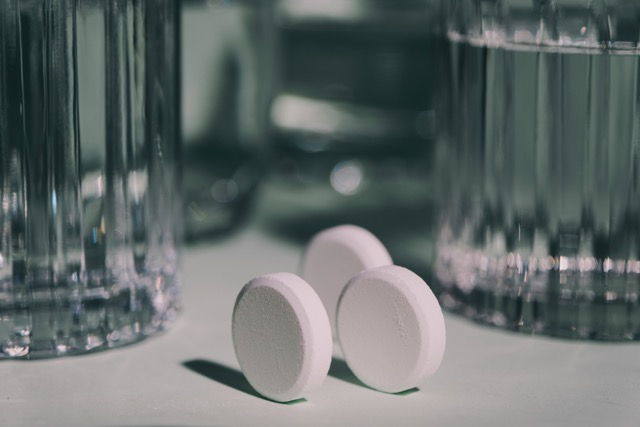Healthy aging with a Mediterranean diet
The abundance of valuable ingredients makes the Mediterranean diet a health booster par excellence

THE GREEKS
If you want to stay fit into old age, you should get used to the eating habits of people who live in Mediterranean countries and still eat traditionally. Their plates don't include pizza, lasagna, etc., but larger portions of fresh and seasonal vegetables prepared with virgin olive oil and seasoned with fresh herbs and spices typical of the country. Fish and seafood are eaten several times a week, including the daily portion of nuts as a snack. Depending on the region, the Mediterranean diet consists of seasonal vegetables, salad and fruit, generously supplemented with grains and legumes, as well as moderate consumption of fermented milk products, cheese, eggs and meat (mainly poultry and lamb) and, of course, a glass of wine.
The traditional Mediterranean diet focuses on healthy fats, with 35 to 45 percent of daily calories being absorbed through high-quality fats (at least half of which comes from olives) and healthy high-fat foods (such as nuts. seeds, olives). This diet is also carbohydrate-rich and moderate in protein. It is packed with cell-protecting, anti-inflammatory and probiotic substances. It is also rich in high-quality vascular and organ-protecting fatty acids and satiating fiber, which are important for intestinal health. The diet uses natural and low-processed foods and gentle methods of preparation. Highly processed junk food, refined starches, sweets and sweetened drinks are taboo.
The abundance of valuable ingredients makes the Mediterranean diet a health booster par excellence: Pretty much every cell and organ benefits from this diet. All important metabolic parameters such as blood sugar, blood lipids, inflammation markers, blood pressure, liver values, body composition and the intestinal microbiome are positively influenced. The diet therefore serves as a model that lowers the risk of overweight, type 2 diabetes, arteriosclerosis, Alzheimer's disease, cancer and other diseases, extends the health span and thus slows down the aging process.
The same is true vice versa — the less you follow a Mediterranean diet, the greater the risk of shortening your life span by five to eight years. This is at least the result of an observational study with almost 5000 participants from southern Italy.
The power of polyphenols
Polyphenols, which are absorbed in abundance with this diet, are a secret recipe of the Mediterranean diet. Polyphenols are found as pigments in plant foods and form the basis of the Mediterranean diet. In particular, green vegetables such as broccoli, spinach and artichokes, fruits such as apples, red grapes, berries, cherries and pears, legumes such as dried beans, but also black and green tea, coffee, dark chocolate, olive oil and red wine are all bursting with these plant substances. Polyphenols have a wide range of effects: They can inhibit inflammatory processes, reduce oxidative stress and promote the formation of anti-oxidants that protect cells and genes. They also have anti-cancer potential.
References
- https://ijbnpa.biomedcentral.com/articles/10.1186/s12966-016-0394-6
- https://bmjopen.bmj.com/content/5/8/e008222
- https://bpspubs.onlinelibrary.wiley.com/doi/10.1111/bcp.12986
Publiziert
22.7.2024
Kategorie
Health

Experte
If you want to stay fit into old age, you should get used to the eating habits of people who live in Mediterranean countries and still eat traditionally. Their plates don't include pizza, lasagna, etc., but larger portions of fresh and seasonal vegetables prepared with virgin olive oil and seasoned with fresh herbs and spices typical of the country. Fish and seafood are eaten several times a week, including the daily portion of nuts as a snack. Depending on the region, the Mediterranean diet consists of seasonal vegetables, salad and fruit, generously supplemented with grains and legumes, as well as moderate consumption of fermented milk products, cheese, eggs and meat (mainly poultry and lamb) and, of course, a glass of wine.
The traditional Mediterranean diet focuses on healthy fats, with 35 to 45 percent of daily calories being absorbed through high-quality fats (at least half of which comes from olives) and healthy high-fat foods (such as nuts. seeds, olives). This diet is also carbohydrate-rich and moderate in protein. It is packed with cell-protecting, anti-inflammatory and probiotic substances. It is also rich in high-quality vascular and organ-protecting fatty acids and satiating fiber, which are important for intestinal health. The diet uses natural and low-processed foods and gentle methods of preparation. Highly processed junk food, refined starches, sweets and sweetened drinks are taboo.
The abundance of valuable ingredients makes the Mediterranean diet a health booster par excellence: Pretty much every cell and organ benefits from this diet. All important metabolic parameters such as blood sugar, blood lipids, inflammation markers, blood pressure, liver values, body composition and the intestinal microbiome are positively influenced. The diet therefore serves as a model that lowers the risk of overweight, type 2 diabetes, arteriosclerosis, Alzheimer's disease, cancer and other diseases, extends the health span and thus slows down the aging process.
The same is true vice versa — the less you follow a Mediterranean diet, the greater the risk of shortening your life span by five to eight years. This is at least the result of an observational study with almost 5000 participants from southern Italy.
The power of polyphenols
Polyphenols, which are absorbed in abundance with this diet, are a secret recipe of the Mediterranean diet. Polyphenols are found as pigments in plant foods and form the basis of the Mediterranean diet. In particular, green vegetables such as broccoli, spinach and artichokes, fruits such as apples, red grapes, berries, cherries and pears, legumes such as dried beans, but also black and green tea, coffee, dark chocolate, olive oil and red wine are all bursting with these plant substances. Polyphenols have a wide range of effects: They can inhibit inflammatory processes, reduce oxidative stress and promote the formation of anti-oxidants that protect cells and genes. They also have anti-cancer potential.
Experte
Referenzen
- https://ijbnpa.biomedcentral.com/articles/10.1186/s12966-016-0394-6
- https://bmjopen.bmj.com/content/5/8/e008222
- https://bpspubs.onlinelibrary.wiley.com/doi/10.1111/bcp.12986
Publiziert
22.7.2024
Kategorie
Health

.svg)














